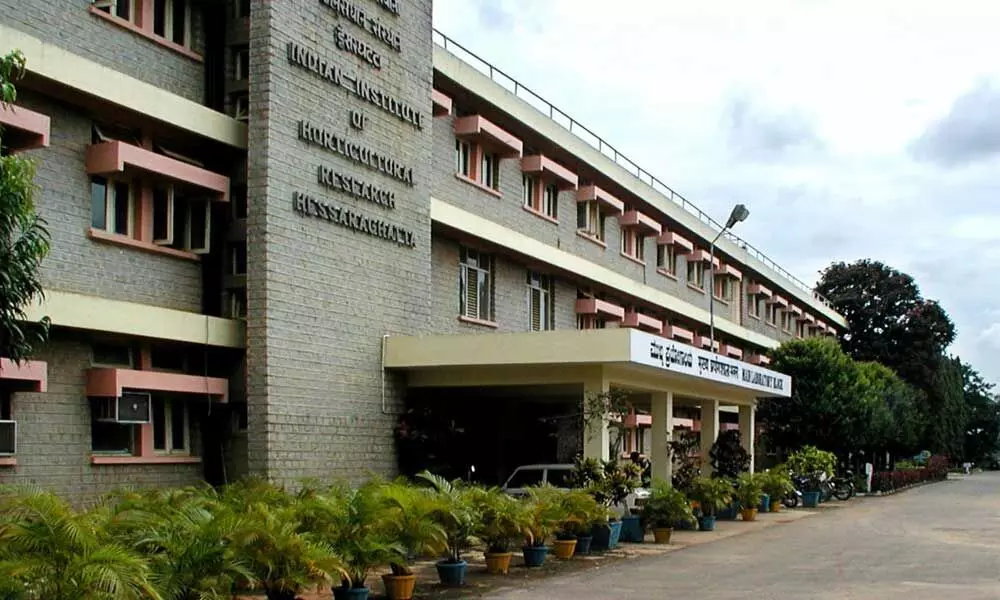Live
- Puri Backs Energy Security Summit in Mangaluru, Calls for Wider Public Engagement
- Daku Maharaj Trailer Released: Balakrishna's Intense Performance as a Master of Killing Gives Goosebumps
- India’s Energy Sector Poised for Growth Amid Challenges: Hardeep Singh Puri
- APPSC Recruitment Exams 2025: Exam Dates and Schedule for 8 Job Notifications Announced
- 2025 Tata Nexon Launched with New Variants, Updated Features, and a Fresh Look
- Director Bobby Kollitalks about ‘Daaku Maharaaj’
- ‘Hisaab Barabar’featuring R. Madhavan to premiere on Jan24
- Kalpara VFX and AI technology launches in Hyderabad
- Allu Aravind Celebrates 76th Birthday with 'Pushpa Ka Baap' Cake and Allu Arjun
- Upcoming film tackles gender equality with humor
Just In
IIHR experts for low-cost pest management to boost farmers' income


IIHR experts for low-cost pest management to boost farmers’ income
Lowering the cost of pest management along with diseases control plays a vital role in not only increasing the farmers' income fivefold but also eliminates 'poison' from our food plates to a large extent, experts at Indian Institute of Horticulture Research (IIHR) believe.
Bengaluru: Lowering the cost of pest management along with diseases control plays a vital role in not only increasing the farmers' income fivefold but also eliminates 'poison' from our food plates to a large extent, experts at Indian Institute of Horticulture Research (IIHR) believe.
Bengaluru-based IIHR's Director M R Dinesh told IANS that the IIHR institute had come up with several technologies to eliminate poison from the food we comsume. However, achieving this requires farmers' cooperation, he added.
"Our scientists have developed pest control technologies that can easily reduce dependence on chemical pesticides, which in turn can help us reduce chemical residues in our food," he explained.
IIHR Crop Protection Division head M Krishna Reddy said that a change in the farmers' attitudes on the use of chemical pesticides was need of the hour.
"Attitude of present-day farmers is that instead of using cheap, lasting and scientific pest-control technologies, they want to depend on strongest chemical spray for instant best results. That is where they fall in debt trap. Pest control is the biggest input in farming and it is labour-intensive too," he said.
He added that in order to reduce dependence on chemicals, IIHR had developed new methods of farming. For example, covering farmland with two rows of bordering crop that is of bigger and denser variety.
"For instance, if a farmer is growing vegetables like chillies, tomatoes, ridge gourd or cucumber, they can grow crops like maize or jowar as the first layer of security against pests; secondly, there should be three-week gap between sowing of bordering crop and the main crop," he said.
He added that when field experts try to explain this method, several farmers get impatient and ask for strongest chemical spray for their fields.
"Though we are carrying out a sustained campaign against the use of chemical pesticides in order to lessen the burden on farmers but there is a long way to go," he said.
IIHR principal scientist, Crop Protection Division, V Sridhar added that the IIHR has developed long-lasting 'tuta trap' 'pheromone trap', 'trichogramma card' and 'sticky cards' which are some of the cost-effective methods that drastically reduce dependence on chemical pesticides.
According to him, a chilly grower spends at least Rs 1 lakh per acre only on pesticides during the entire crop cycle, and some farmers are ready to spend up to Rs 2 lakh.
"Be it ridge gourd or cucumber or tomato, a farmer is spending no less than Rs 50,000 for at least 10 to 15 cycles of chemical spray. Whereas if the same farmer adopts scientific methods, he will spend less than Rs 10,000 for the entire crop cycle and his yield will also increase by 30 per cent due to fall in crop loss from 40 per cent to just five per cent. Thus, he will not incur huge losses and save himself from the debt trap," Sridhar explained.
Plant pathologist B Mahesh observed that agriculture is one sector where quantity of land is fixed and no amount of resources can help grow it. "Whereas all other input costs are at our disposal, by reducing chemical spray, we are also reducing the labour cost drastically and making agriculture less labour-intensive, besides improving the yield," he said.

© 2025 Hyderabad Media House Limited/The Hans India. All rights reserved. Powered by hocalwire.com






